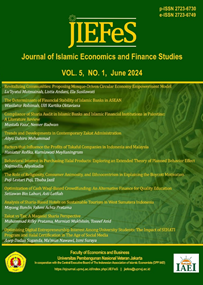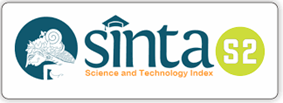Optimizing Digital Entrepreneurship Interest Among University Students: The Impact of SEHATI Program and Halal Certification in The Age of Social Media
DOI:
https://doi.org/10.47700/jiefes.v5i1.6672Keywords:
Halal Certification, Digital, Entrepreneur, Social MediaAbstract
The university is committed to developing digital entrepreneurship among students, which is realized through concrete efforts in the classroom by integrating entrepreneurial and Sharia business learning and e-commerce and outside the classroom with digital marketing training programs for students. Despite having interest and potential in digital entrepreneurship, students may face limited access and knowledge related to the halal certification process. The SEHATI program, which offers free halal certification, can be a solution to overcome these barriers. However, the effectiveness of this program in increasing students' interest in digital entrepreneurship still needs to be investigated. This research was conducted to determine the influence of the free halal certification program (SEHATI) and social media on students' interest in digital entrepreneurship. This study uses descriptive analysis with a quantitative approach. Data collection is based on surveys and other relevant sources measuring digital entrepreneurial interest, participation in the halal certification program, and the level of social media use. Then, the multiple linear regression model is used with Significance Tests using T-test and F-test. The research results show that the SEHATI program and social media significantly influence students' interest in digital entrepreneurship both partially and simultaneously
References
A.G Eka Wenats dkk, Integrated Marketing Communications (Komunikasi Pemasaran di Indonesia), Jakarta: PT. Gramedia Pustaka Utama, 2002.
Allen, J. (2019). Digital entrepreneurship. Routledge.
Anzellyta, T., & Fittria, A. (2022). The Effectiveness of The Halal Product Guarantee Law on Business Awareness in Registration of Halal Certification in Indonesia. Walisongo Law Review (Walrev), 4(1), 97-120. doi: https://doi.org/10.21580/walrev.2022.4.1.11272.
Basuki, Agus Tri. (2015). Pengantar Ekonometrika. Yogyakarta: Danisa Media.
Brown, A., & Jones, B. (2017). The impact of social media on digital entrepreneurship: A review of the literature. Journal of Entrepreneurship, 15(2), 173-189.
Burhan Bungin, Metodologi Penelitian Kuantitatif Komunikasi, Ekonomi, Dan Kebijakan Public Ilmu-Ilmu Sosial Lainnya (Jakarta: Kencana, 2005)..
Chakraborty, U., & Biswal, S. K. (2023). Impact of social media participation on female entrepreneurs towards their digital entrepreneurship intention and psychological empowerment. Journal of Research in Marketing and Entrepreneurship, 25(3), 374-392.
Chen, L., et al. (2020). Social media use and digital entrepreneurship among university students: A systematic review. International Journal of Entrepreneurship, 24(3), 345-362.
Darwin, Muhammad dkk. (2020). Metode Penelitian Pendekatan Kuantitatif. Bandung: Media Sains Indonesia.
Ermawati, Novi (2016), “Faktor-Faktor yang Mempengaruhi Minat Berwirausaha Mahasiswa Program studi PKK Konsentrasi Tata Busana Fakultas Teknik UNNES”
Fasa, M. I., Febrianty, A., Khoerulloh, K., Arisa, A., Utami, W., Santoso, I. R., ... & Haerany, A. (2020). Eksistensi BISNIS ISLAMI di era revolusi industri 4.0. Penerbit Widina.
Ghozali Imam, Aplikasi Analisis Multivariate Dengan Program IBM SPSS 21 Update PLS Regresi (Semarang: Badan Penerbit Universitas Diponegoro, 2013).
Gunawan, Ce. (2019). Mahir Menguasai SPSS: Mudah Mengolah Data dengan IBM SPSS Statistic 25. Yogyakarta: Deepublish, 2019.
Hakim, B. A. H., Mujahidah, A. S., & Rusydiana, A. S. (2022). Sentiment analysis on Halal certification. Harmoni, 21(1), 78-93.
Hardani, Metode Penelitian Kualitatif & Kuantitatif.
Hendri Tanjung, Metodologi Penelitian Ekonomi Islam, (Jakarta: Gramata Publishing, 2013), 97.
Hengky (2016), “Pengaruh Faktor Internal, Faktor Eksternal dan Faktor Pendidikan Terhadap Intensi Kewirausahaan Alumni Mahasiswa”
Hermawan Kartajaya, Waizly Darwin, Connect : Surfing New Wave Marketing, Jakarta: PT. Gramedia Pustaka Utama, 2010
Ihwanudin, Nandang, et al. EKONOMI DAN BISNIS DIGITAL. Edited by Damayanti, Evi, CV WIDINA MEDIA UTAMA, 2023.
Indriantoro, (Nur Indriantoro, 2002)
John Wiley & Sons, Big Brands, Big Trouble: Lessons Learned the Hardway, 2001.
Kamarulzaman, Y., Veeck, A., Mumuni, A. G., Luqmani, M., & Quraeshi, Z. A. (2016). Religion, markets, and digital media: Seeking halal food in the US. Journal of Macromarketing, 36(4), 400-411.
Khan, M. A. (2019). The influence of halal certification on consumer behavior: A systematic literature review. Journal of Islamic Marketing, 10(3), 735-756.
Kurniawan, Agung Widhi dan Zarah Puspitaningtyas. (2016). Metode Penelitian Kuantitatif. Yogyakarta: Pandiv Buku.
Laura Mazur, Louella Miles, Percakapan Dengan Para Master Pemasaran, Jakarta: PT. Gramedia Pustaka Utama, 2007.
Lestari, Elsi (2015), “Pengaruh Pengetahuan, Lingkungan dan Motivasi Terhadap Minat Berwirausaha Mahasiswa Fakultas Syariah dan Bisnis Islam Syekh Nurjati Cirebon”
Marginingsih, Ratnawaty dkk. (2020). Metode Penelitian Bisnis. (Yogyakarta: Graha Ilmu.
Mu’alimah, Umi (2015), “Analisis Pengaruh Faktor Motivasi, Lingkungan dan Pengetahuan Terhadap Minat Berwirausaha Mahasiswa Pada Koperasi Mahasiswa STAIN Salatiga 2014”
Mulyadi, Hari (2017), “Faktor-Faktor yang Berpengaruh Terhadap MInat Berwirausaha Mahasiswa Manajemen Bisnis Syariah Fakultas Ekonomi dan Bisnis Islam IAIN Surakarta”
Nachrowi, Nachrowi Djalal dan Hardius Usman. (2002). Penggunaan Teknik Ekonometri. Jakarta: Raja Grafindo Persada.
Nandy. Pengertian Media Sosial, Sejarah, Fungsi, Jenis, Manfaat, dan Perkembangannya. Gramedia Blog. URL: https://www.gramedia.com/literasi/pengertian-media-sosial/. Diakses 22 Agustus 2023.
Nazir, M. (2011). Metodologi Penelitian. Bogor, Ghalia Indonesia.
Nikou, S., Brännback, M. E., Orrensalo, T. P., & Widén, G. (2020). Social media and entrepreneurship: exploring the role of digital source selection and information literacy. Understanding Social Media and Entrepreneurship: The Business of Hashtags, Likes, Tweets and Stories, 29-46.
Nur, S., & Istikomah, I. (2021). Progam SEHATI: Kemudahan Pelaksanaan Sertifikasi Halal bagi UMKM. At-Tasharruf "Jurnal Kajian Ekonomi dan Bisnis Syariah", 3(2), 72-79. doi: https://doi.org/10.32528/at.v3i2.6780.
Nuryuliana, Aflit (2014), “Analisis Faktor-Faktor yang Mempengaruhi Minat Berwirausaha Kalangan Mahasiswa Fakultas Ekonomi dan Bisnis Universitas Muhammadiyah Surakarta”
Olanrewaju, A. S. T., Hossain, M. A., Whiteside, N., & Mercieca, P. (2020). Social media and entrepreneurship research: A literature review. International Journal of Information Management, 50, 90-110.
P. Robinson, Strategic Management, Prentice Hall Inc.
Patria, Paulus (2014), “Faktor-Faktor yang Mempengaruhi MInat Berwirausaha Fakultas Ekonomika dan Bisnis Universitas Diponegoro Semarang”
Philip Kotler, Waldemar Pfoertsch, Business to Business Brand Management, Springer, 2006.
Primadaru, Noormalita (2017), “Analisis Faktor-Faktor yang Berpengaruh Pada Minat Berwirausaha Mahasiswa” Jurnal Economia, Volume 13, No 1. April 2017
Puspita, R. E., Lan, V. H., Iskandar, I., Auliya, Z. F., & Nabhan, F. (2023). Social Media and Halal Industry in Indonesia. In E3S Web of Conferences (Vol. 448, p. 02016). EDP Sciences.
Putri, D. E., Sudirman, A., Suganda, A. D., Kartika, R. D., Martini, E., Susilowati, H., ... & Roslan, A. H. (2021). Brand Marketing. Penerbit Widina.
Qurrata, V. A., & Puteri, R. D. L. (2021, November). Halal Label, Trust and Brand Loyalty Among Social Media Consumer for Food Business in Indonesia. In BISTIC Business Innovation Sustainability and Technology International Conference (BISTIC 2021) (pp. 48-57). Atlantis Press.
Rani, Wiwi (2015) “Faktor-Faktor yang Mempengaruhi Keinginan Mahasiswa Untuk Berwirausaha (Mahasiswa S-1 Jurusan Akuntansi Fakultas Ekonomi dan Bisnis Universita Brawijaya)”
Rathee, R., & Rajain, P. (2017). Entrepreneurship in the digital era. Asia Pacific Journal of Research in Business Management, 8(6), 52-63.
Rusda dan Shinta (2014), “Faktor-Faktor yang Memotivasi MInat Mahasiswa Dalam Berwirausaha Di Politeknik Negeri Batam” Jurnal Ekonomi Pendidikan dan Kewirausahaan. Volume 2. No 1, April 2014
Sahut, J. M., Iandoli, L., & Teulon, F. (2021). The age of digital entrepreneurship. Small Business Economics, 56(3), 1159-1169.
Santoso, Singgih. (2014). Statistik Parametrik: Konsep dan Aplikasi dengan SPSS. Jakarta: PT Elex Media Komputindo..
Sihabudin, dkk. (2021). Ekonometrika Dasar: Teori dan Praktik Berbasis SPSS. Jawa Tengah: CV Pena Persada.
Smith, J. et al. (2018). Free halal certification programs and entrepreneurship: Evidence from a field experiment. Journal of Business Ethics, 145(2), 411-425.
Steininger, D. M. (2019). Linking information systems and entrepreneurship: A review and agenda for IT‐associated and digital entrepreneurship research. Information Systems Journal, 29(2), 363-407.
Sugiyono, “Metodologi Penelitian Kuantitatif Kualitatif Dan R&D,” Alpabeta, Bandung (2011).
Suliyanto. (2011). Ekonometrika Terapan Teori & Aplikasi dengan SPSS. Yogyakarta: CV Andi Offset.
Suryani and Hendryadi, Metode Riset Kuantitatif (Jakarta: PT Fajar Interpratama Mandiri, 2015).
Syafii, Ahmad (2017), “Faktor-Faktor yang Mempengaruhi MInat Berwirausaha Fakultas Ekonomi dan Bisnis Islam Universitas Islam Negeri Sunan kalijaga Yogyakarta”
Syafina, Laylan. (2019). Metode Penelitian Akuntansi Pendekatan Kuantitatif. Medan: FEBI UIN-SU Press.
Syahrum dan Salim. (2012) Metodologi Penelitian Kuantitatif. Bandung: Cipustaka Media.
Syarifuddin, S., Arfah, F., Rahmawati, I., Mulyono, S., Mutafarida, B., Trimulato, T., ... & AK, M. F. (2020). EKONOMI SYARIAH.
Downloads
Published
Issue
Section
License
Copyright (c) 2024 Asep Dadan Suganda, Ma'mun Nawawi, Ismi Suraya

This work is licensed under a Creative Commons Attribution 4.0 International License.
Authors who publish with this journal agree to the following terms:
- Authors retain copyright and grant the journal right of first publication with the work simultaneously licensed under a Creative Commons Attribution 4.0 International License that allows others to share the work with an acknowledgment of the work's authorship and initial publication in this journal.
- Authors can enter into separate, additional contractual arrangements for the non-exclusive distribution of the journal's published version of the work (e.g., post it to an institutional repository or publish it in a book), with an acknowledgment of its initial publication in this journal.
- Authors are permitted and encouraged to post their work online (e.g., in institutional repositories or on their website) before and during the submission process, as it can lead to productive exchanges, as well as earlier and greater citation of published work.

This work is licensed under a Creative Commons Attribution 4.0 International License.











